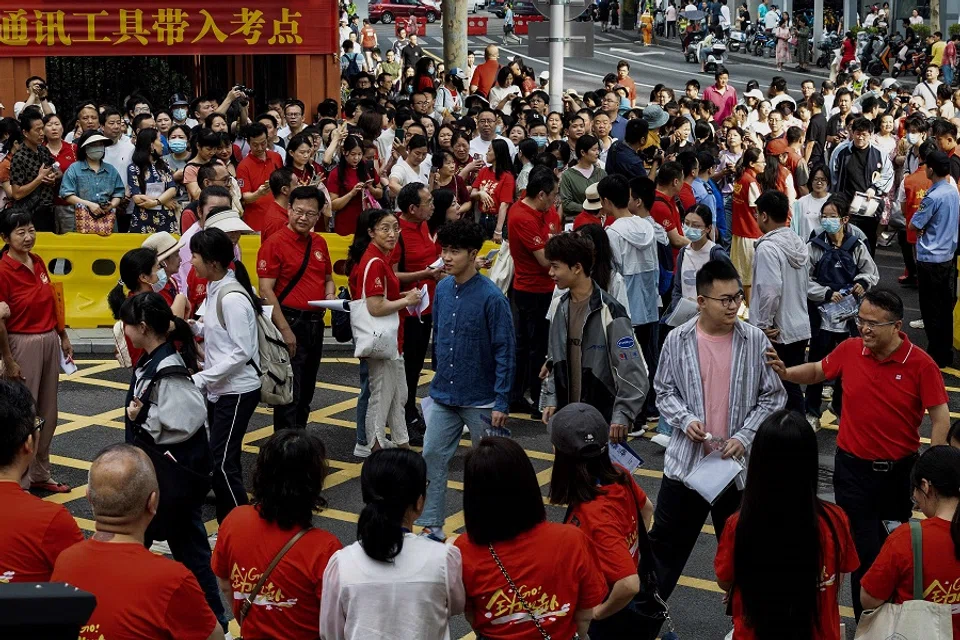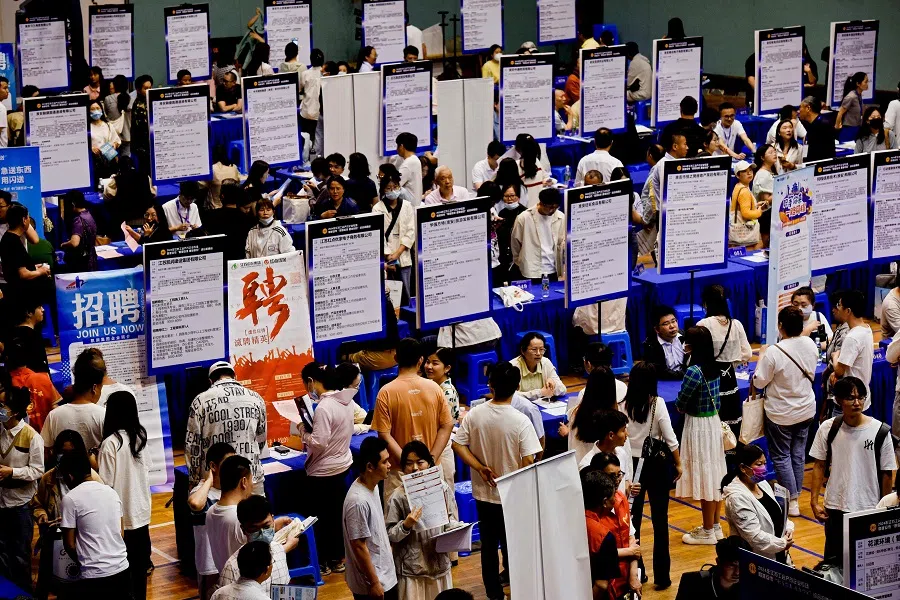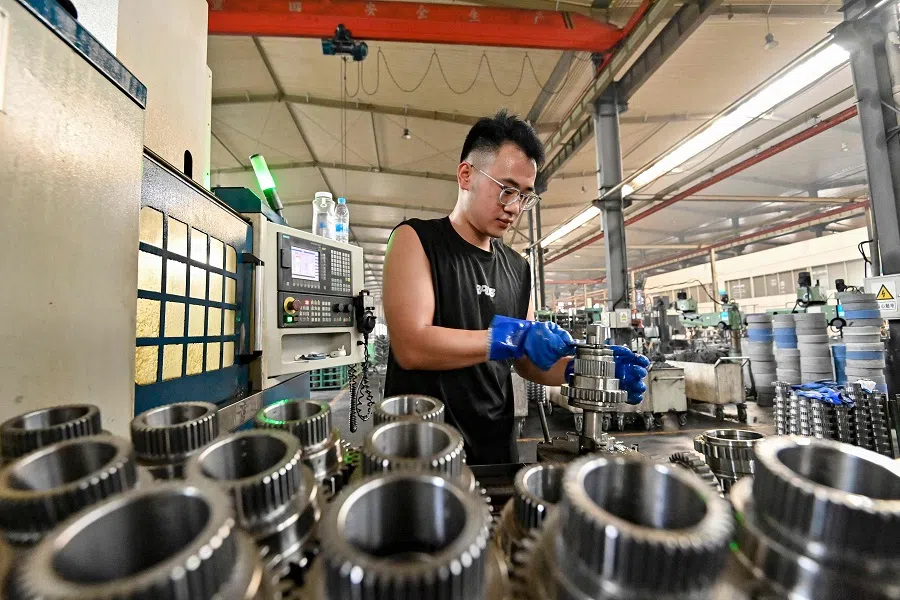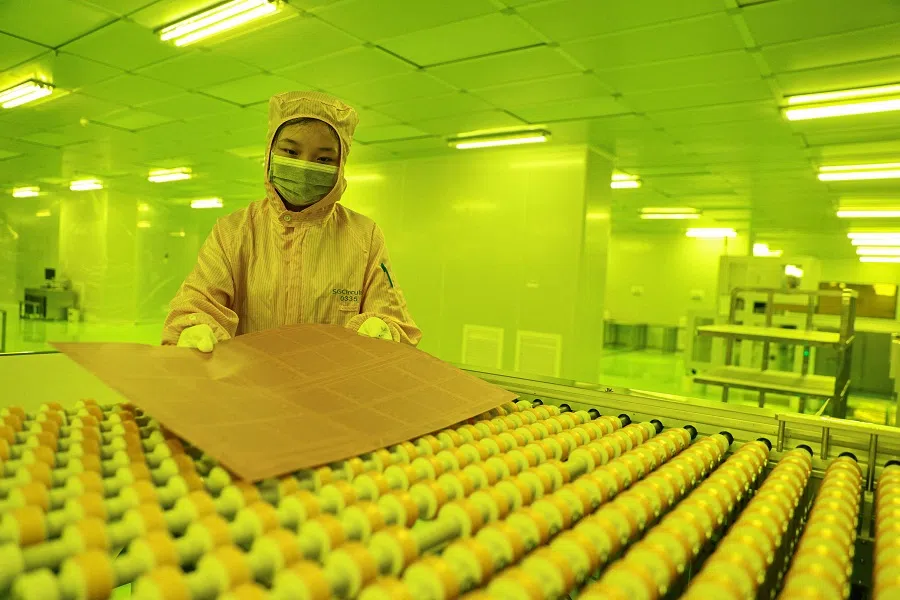Blue-collar jobs gain appeal among Chinese university graduates
Lianhe Zaobao journalist Li Kang speaks to young people in China about their job prospects and looks at the growing trend of university graduates giving up their hopes of getting white-collar jobs in favour of blue-collar jobs.

After graduating from a top Chinese university and working as a visual designer for four years, Liu Litai (pseudonym) became a pet groomer.
In an interview with Lianhe Zaobao, the 28-year-old said that she did not see a clear path of progression in her previous white-collar job, and might even be retrenched after turning 30. But learning a craft has given her the greatest sense of security: “I can survive even if I put up a street stall.”
After working as a pet groomer for nearly two years, Liu’s monthly income increased from 3,500 RMB (US$486) to around 10,000 RMB. At the moment, she is not considering career planning and prefers to “take each day as it comes”.
Manual work and blue-collar jobs
Over the past year, an increasing number of Chinese graduates like Liu are shedding their reservations to take on light manual jobs. Unlike conventional manual work that is physically demanding, light manual work takes place mostly indoors, and includes jobs like baristas, convenience store staff, bookstore staff, cashiers and appliance installers.
As interest in light manual work grows among Chinese graduates, the competition for such jobs has become more involuted.
On the Chinese social media platform, Douban, an interest group for light manual work that was founded in 2022 saw its membership multiply by several times over the past year to exceed 88,000. In June, Chinese job platform Zhaopin released its annual report on blue-collar talent development (《2024蓝领人才发展报告》), which showed that in the first quarter of 2024, applications for blue-collar jobs among job-seekers below the age of 25 increased by 165% year-on-year as compared to 2019.
As interest in light manual work grows among Chinese graduates, the competition for such jobs has become more involuted. 25-year-old Feng Yue (pseudonym) told Lianhe Zaobao that when she was working as a security guard last year, her salary was 3,800 RMB and there was no requirement for her to have industry-relevant certification. But as more Gen Z-ers set their sights on such jobs — especially those born after 2000 or 2005 — 80 to 90% of security jobs now require their applicants to be certified.

After graduating from university as an English major, Feng was unsuccessful in her attempts to become a postgraduate student, civil servant or public servant. In the past six months, she has worked as a security guard, production line worker and convenience store employee.
Feng’s next career move is to enrol in a training course to acquire a skill. She decided to spend 9,000 RMB to study fashion design instead of becoming an electrician or hairdresser because “clothing is a basic need, so the prospects are better”.
... the supply of good jobs did not keep pace, so university graduates are reaping diminishing returns for their investments in education, and a growing number of them are turning to blue-collar work. — Professor Deng Xize, School of International Studies, Sichuan University
Accelerated devaluation of academic qualifications
A study carried out by the Shanghai Academy of Educational Sciences in 2013 found that in the decade between 2010 and 2020, the number of university graduates in China would increase by 94 million. Over the same period, only 46 million white-collar jobs would be available domestically, so more than half of Chinese graduates would have to take on blue-collar jobs.
However, as the Chinese economy continues its sluggish recovery, the tenuous job market in the country means that the jostling for blue-collar work is becoming more intense.
This year, a record 11.87 million Chinese students finished high school. At the same time, Chinese authorities announced that youth unemployment rates remain high. In June this year, 13.2% of non-schooling youths between the ages of 16 and 24 did not have a job; for those between the ages of 25 and 29, it was even higher at 14.9%.
In a Lianhe Zaobao interview, Deng Xize, an international relations professor at Sichuan University, said that university enrolment has increased greatly as compared to the 1990s, growing from 610,000 places in 1990, to 5.04 million in 2005, and 10.14 million in 2022. However, the supply of good jobs did not keep pace, so university graduates are reaping diminishing returns for their investments in education, and a growing number of them are turning to blue-collar work.

Deng feels that as technological progress accelerates, especially in the area of artificial intelligence that can replace repetitive work, the job market would only become more challenging in time to come. He said, “While we may feel sorry for university graduates who are doing food delivery or ride-hailing work now, even such opportunities may become scarce in future.”
After putting in much effort to obtain a degree only to discover that one’s market value is not as high as envisioned, the devaluation of academic qualifications in China has worsened in recent years.
... the harsh reality is that it is becoming increasingly difficult globally to secure a stable job and a normal income. As a result, both lowly and highly qualified job seekers experience feelings of hopelessness. — Deng
Deng explained that the devaluation of academic qualifications is a global phenomenon, and university graduates in developed nations have taken on blue-collar work early on. In fact, he feels that given the confluence of factors like technological progress and the education system failing to meet societal needs, a “crash” in the value of academic qualifications is a more apt description than “devaluation”.
For Deng, the harsh reality is that it is becoming increasingly difficult globally to secure a stable job and a normal income. As a result, both lowly and highly qualified job seekers experience feelings of hopelessness. Those with lower qualifications are less motivated to invest in education, seeing that it no longer yields a corresponding improvement in quality of life. Conversely, those with higher qualifications find their expectations diminished as their academic achievements result in lower returns compared to previous generations.
Mismatch in talent supply and market demand
Disillusioned by the lack of opportunities in white-collar jobs, Chinese university students have shifted from an obsessive belief in academic qualifications to valuing practical skills. This shift also reflects a disconnect between China’s higher education system and the actual demands of the job market.
In a commentary published in Lianhe Zaobao, Liu Hongbin, a lecturer at the Zhejiang Sci-Tech University School of Economics and Management, and Yu Gui’e, a lecturer at the Zhejiang Gongshang University School of Accounting, highlighted that tertiary education institutions must obtain administrative approvals for the academic disciplines they offer. This requirement makes it difficult for these institutions to stay attuned to market needs, resulting in a disconnect between the talent they produce and the demands of the job market.
China is also undergoing significant industrial upgrading and transformation. The rapid growth of its digital economy in recent years has exacerbated the mismatch between the talent produced by its tertiary education system and the needs of its evolving industries. As a result, many graduates struggle to make a living through traditional hard work or manual labour.
“Young people who earn a living through physical work, manage their own lives as they see fit and redefine success on their own terms — this is progress.” — Wei Zhizhong, Chief Psychological Counsellor, Guangzhou’s Yiweiduxin Psychology Counselling Clinic

Looking at the figures, the demand for blue-collar workers is growing. Based on the numbers from Zhaopin, blue-collar job openings have more than tripled since 2019.
According to a 2023 research report on China’s blue-collar workers employment (《2023中国蓝领群体就业研究报告》), the monthly income of blue-collar workers grew by 125% from 2,684 RMB to 6,043 RMB from 2012 to 2023; during the same period, the salaries of white-collar workers only grew by 25% from 6,439 RMB to 8,388 RMB.
In an interview with Lianhe Zaobao, Wei Zhizhong, the chief psychological counsellor at Guangzhou’s Yiweiduxin Psychology Counselling Clinic (一苇渡心心理咨询), said that the growing preference among Chinese youths for manual work instead of going all out to join the civil service is, to a certain extent, a return to rationality.
Wei observed that the traditional Chinese mindset often views manual labour as inferior. He stated, “Young people who earn a living through physical work, manage their own lives as they see fit and redefine success on their own terms — this is progress.”
This article was first published in Lianhe Zaobao as ““孔乙己长衫”不管用 中国大学生蓝领谋出路”.





